Trading Strategies
On Alkimiya, one can take a long or short position based on one’s view on the impact of the on-chain events. Simply put, if you think an event(s) will cause significant network congestion, go long and if you think the event(s) are overhyped or the overall usage will slow down, go short.
However, trading on Alkimiya is more than that. Parameters such as entry price and size affect your orders and as a result, your PnL.
Before diving in, it’s imperative to understand the parameters/data that affect trading on Alkimiya. Make sure to check out our and Glossary for unfamiliar terms.
1. Check the Avg. BTC fee
Avg. BTC feeThis is the underlying index. It is the average of the BTC Fee Index across a pool’s duration and is updated daily at 3am UTC.
With reference to the data available on Mempool.space, this is the numerical data of the graph tracking median feerate.
The settlement of this index is based on the final Avg. BTC fee on the last day. In essence, when trading, keep in mind the question: “What will the Avg. BTC fee be at the end of this pool?”.

Forecast - Avg. BTC fee
Resources
2. Check the live chart on Alkimiya
This is the chart of Avg. BTC fee for a specific pool. Since it tracks the average instead of the spot feerate, it’s a closer visualization of where the final Avg. BTC fee might end up at.
There are 2 lines on this chart:
- BTC fee (orange); and
- Avg. BTC fee (teal)
Due to the averaging effect, feerate spikes at the beginning of the pool period usually have more visible impacts on the Avg. BTC fee than those towards the end of the pool period.
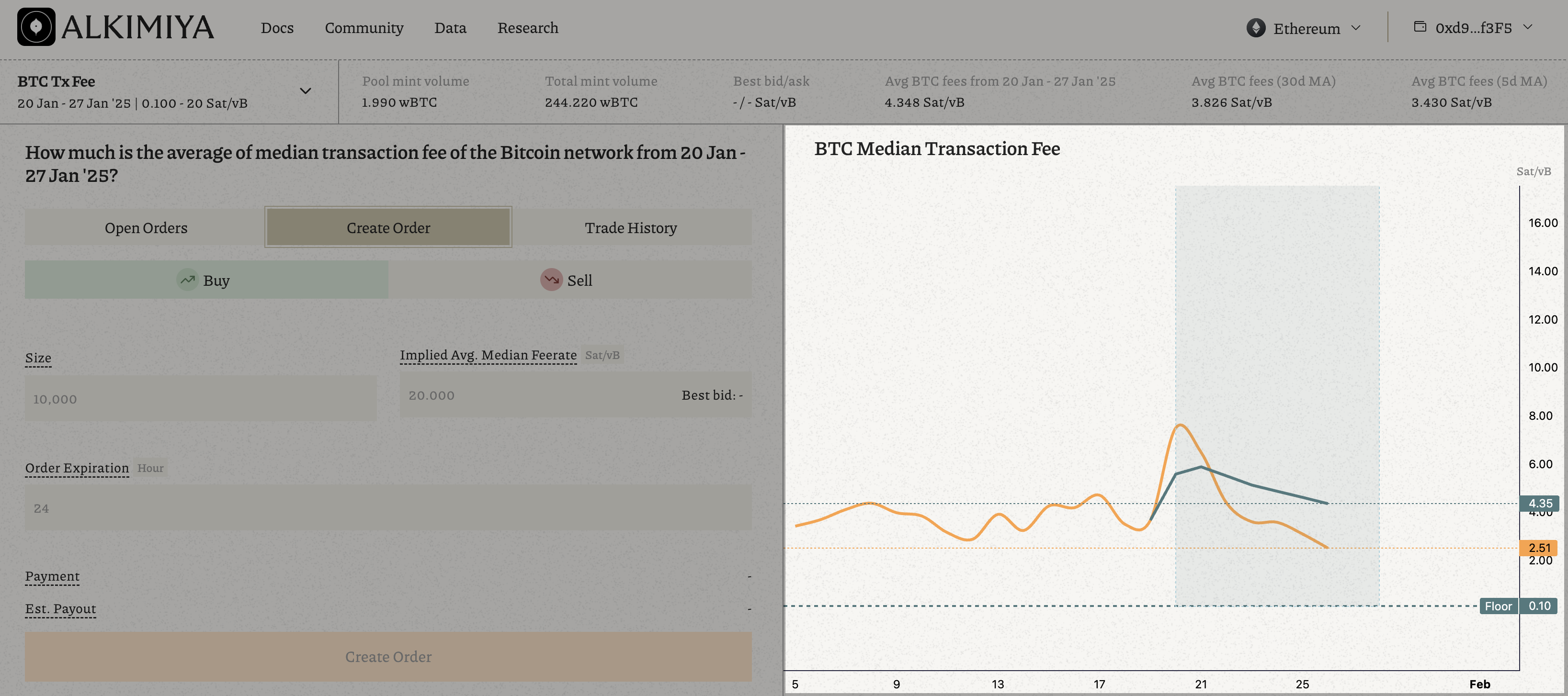
Forecast - Live Chart
3. Select the pool you wish to trade in
There are at least 2 active pools to trade in at any given time. One with a lower feerate range, and the other with a higher feerate range.
The lower end of the range is known as the Floor . The higher end of the range is known as the Cap.
Before the pools begin, the feerate range will be calculated based on historical volatility. The range will remain constant throughout the pools.
The Avg. BTC fee can serve as an indication of which pool to trade in. Ensure that your desired pool is chosen before moving to the next step.
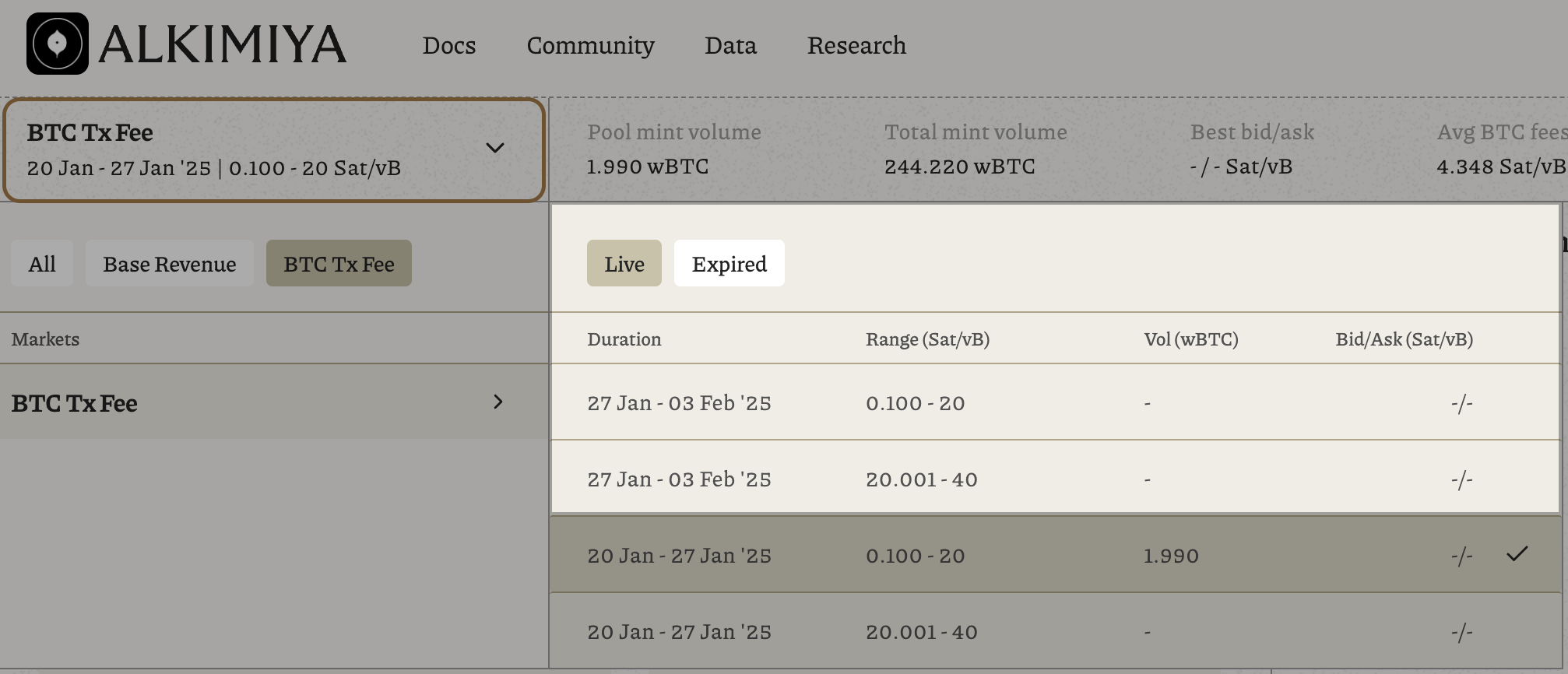
Forecast - Pool Selection
Resources
4. Check 'Open Orders' and 'Trade History' in the orderbook
On ‘Open Orders’, these are the available orders you can pick from within a pool. They are made by other traders on Alkimiya. Categorised under Buy and Sell, you can choose to fill Long order/s or a Short order/s respectively.
On ‘Trade History’, these are the orders that were made and filled by traders on Alkimiya.
Using these two sections, gain insight on the level of bullishness or bearishness of other traders.
Open Orders
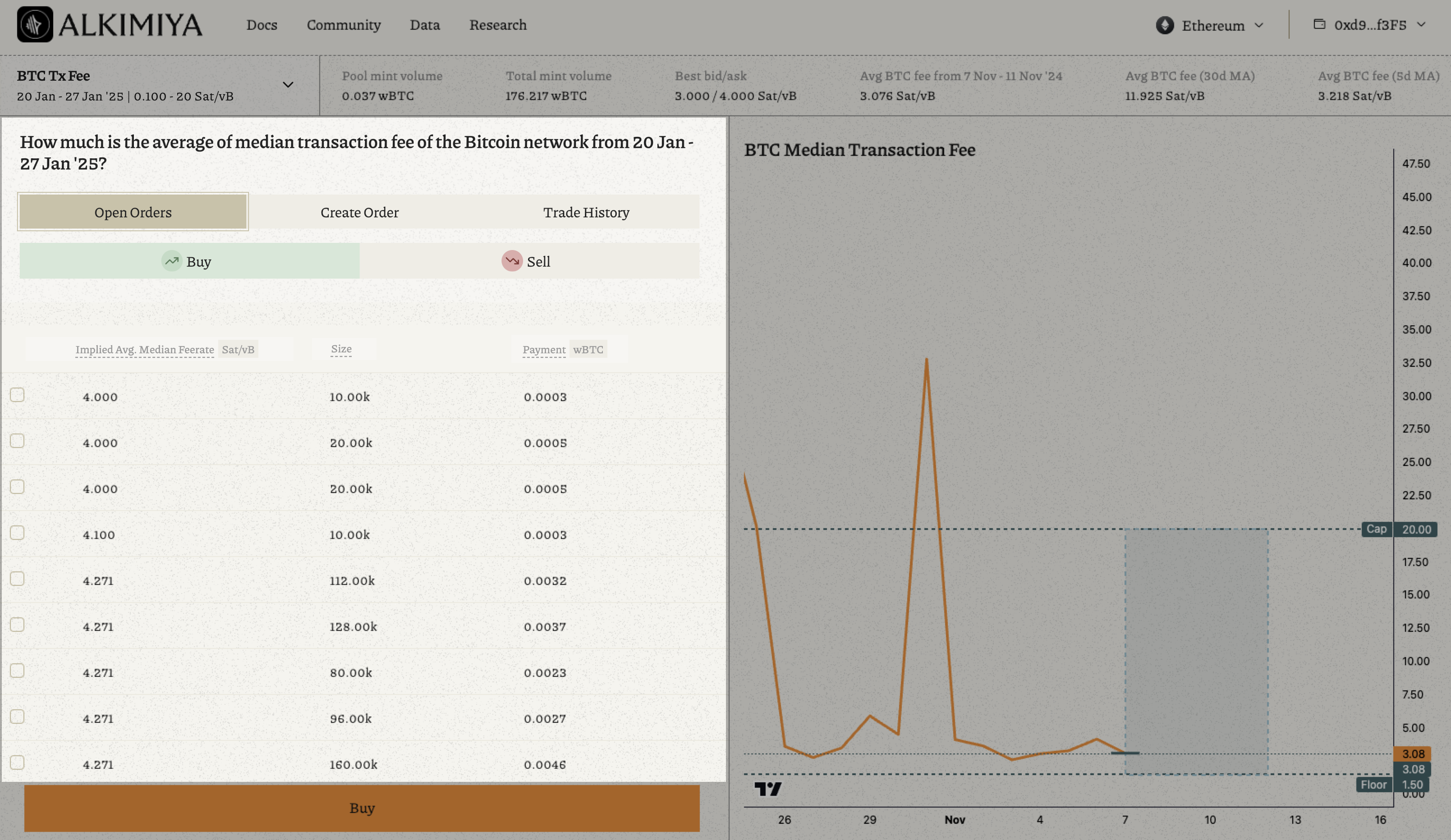
Forecast - Open Orders, Long orderbook
Trade History
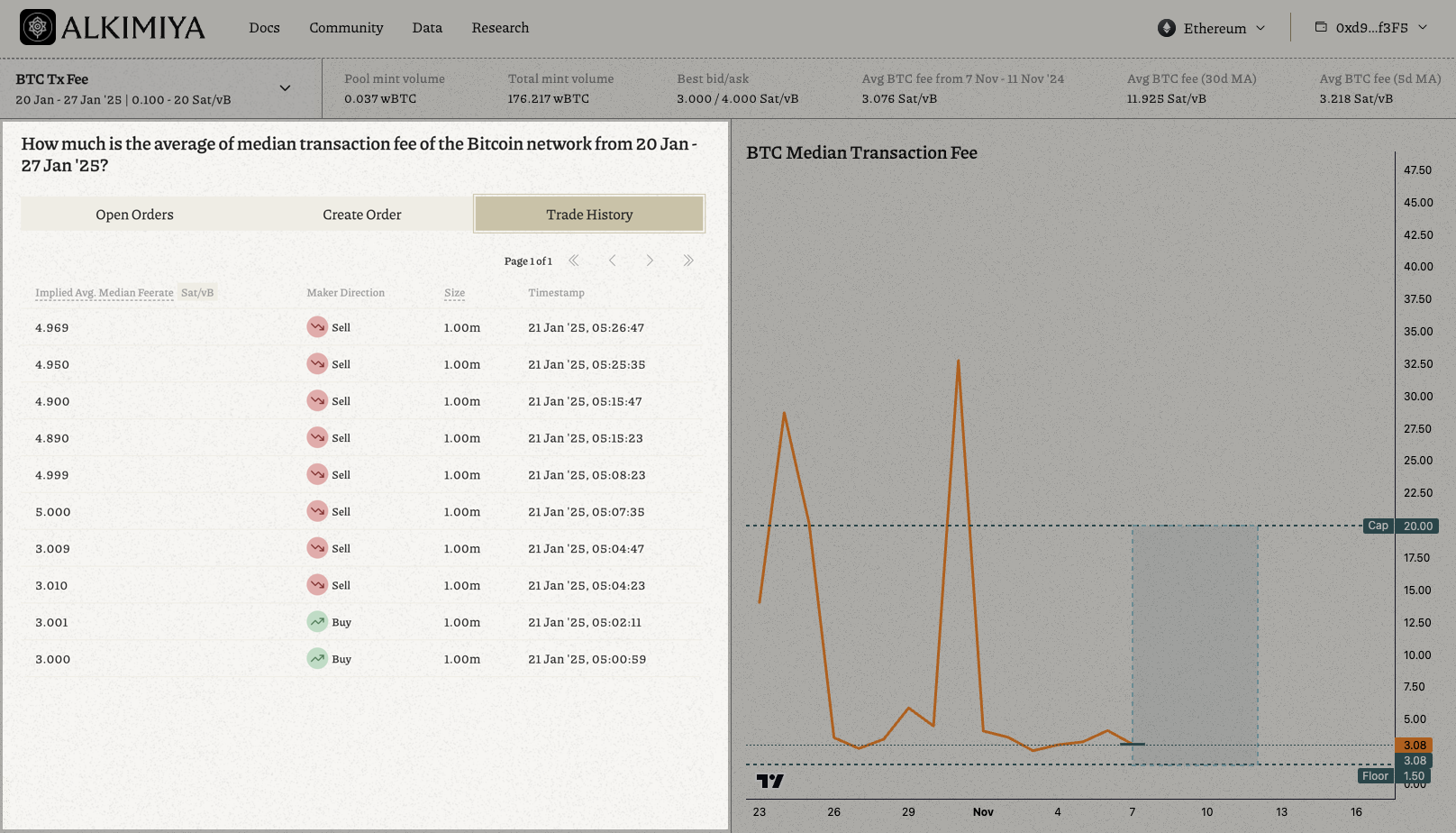
Forecast - Trade History
Identifying good orders can get confusing, but it’s not impossible. Before scrutinizing the available orders, consider the decisions you’ve made above and your risk appetite.
Resources
5. Decide on a direction you want to take
There are only 2 directions to choose from - Long or Short.
The general rule of thumb is:
For Long orders, if the final Avg. BTC fee lands above your order’s Implied Avg. Median Feerate, you profit the difference.
For Short orders, if the final Avg. BTC fee lands below your order’s Implied Avg. Median Feerate, you profit the difference.
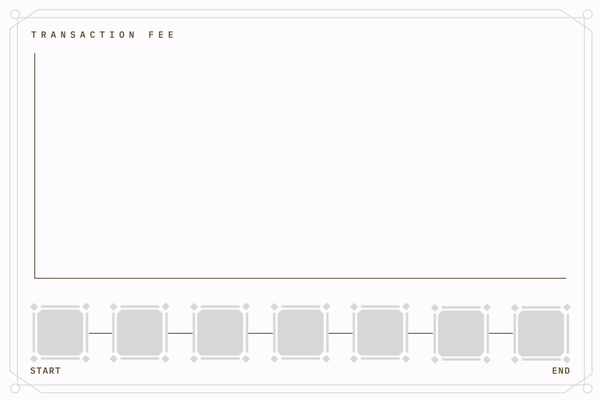
Long Order (gif)
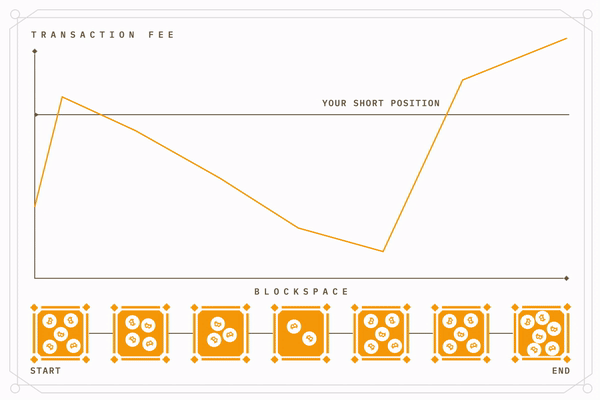
Short Order (gif)
If you've decided to Long
- Navigate to the Long orderbook and compare the available
Implied Avg. Median FeerateandAvg. BTC fee
The aim here is to:- Select an order with a lower entry price than the index
i.e.Implied Avg. Median Feerate<Avg. BTC fee; or - Select an order with an entry price that is acceptable to you
i.e.Implied Avg. Median Feerate< your expected finalAvg. BTC fee
- Select an order with a lower entry price than the index
- Yay, you found a good order! But what is your risk appetite?
Sizeis the representation of your risk appetite. The larger the size, the riskier you want to be. However, if you have confidence in the order, go ahead and fill it!
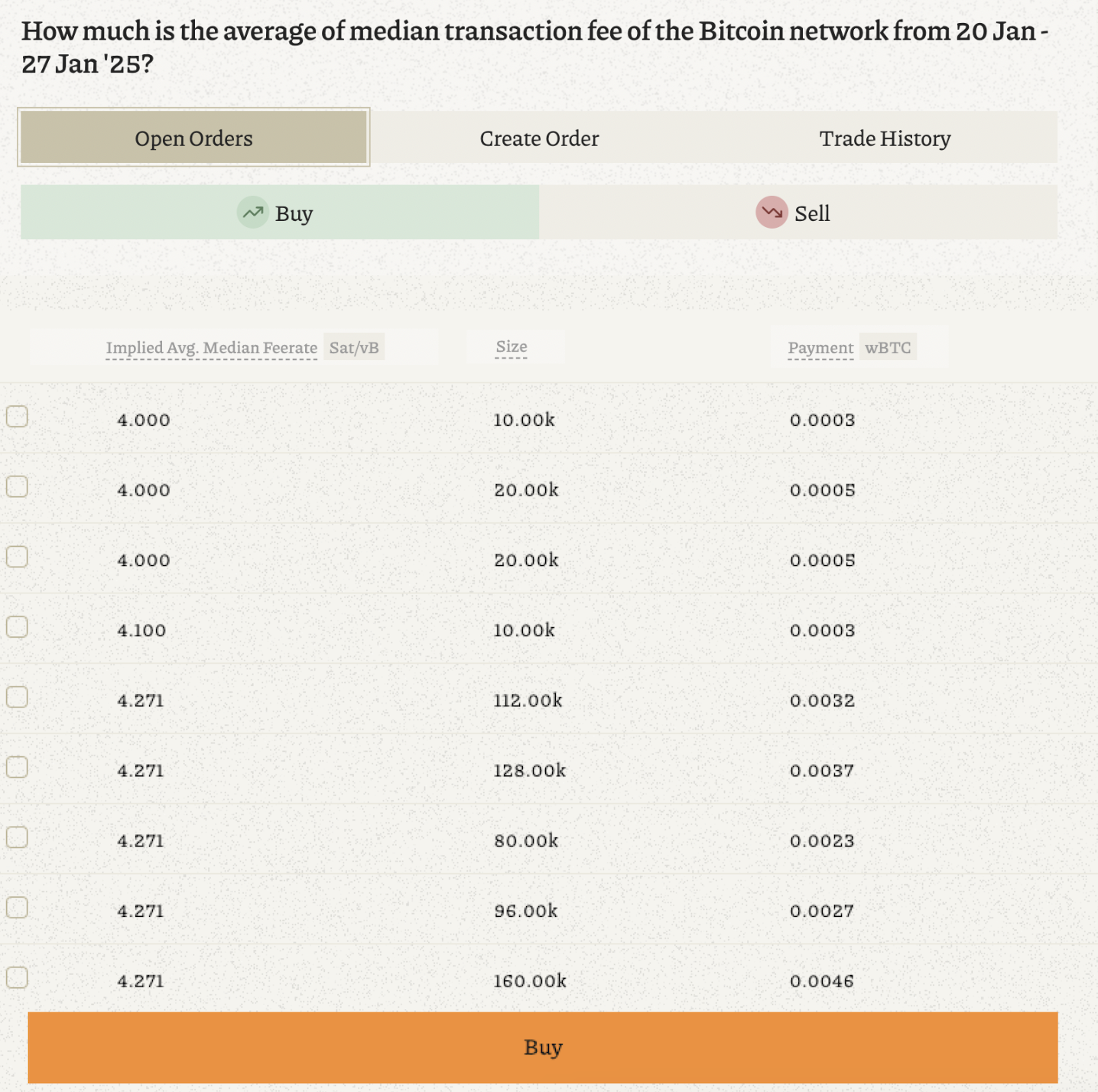
Forecast - Open Orders, Long orderbook
Resources
If you've decided to Short
- Navigate to the Short orderbook and compare the available
Implied Avg. Median FeerateandAvg. BTC fee
The aim here is to:- Select an order with a higher entry price than the index
i.e.Implied Avg. Median Feerate>Avg. BTC fee; or - Select an order with an entry price that is acceptable to you
i.e.Implied Avg. Median Feerate> your expected finalAvg. BTC fee
- Select an order with a higher entry price than the index
- Yay, you found a good order - go ahead and fill it!
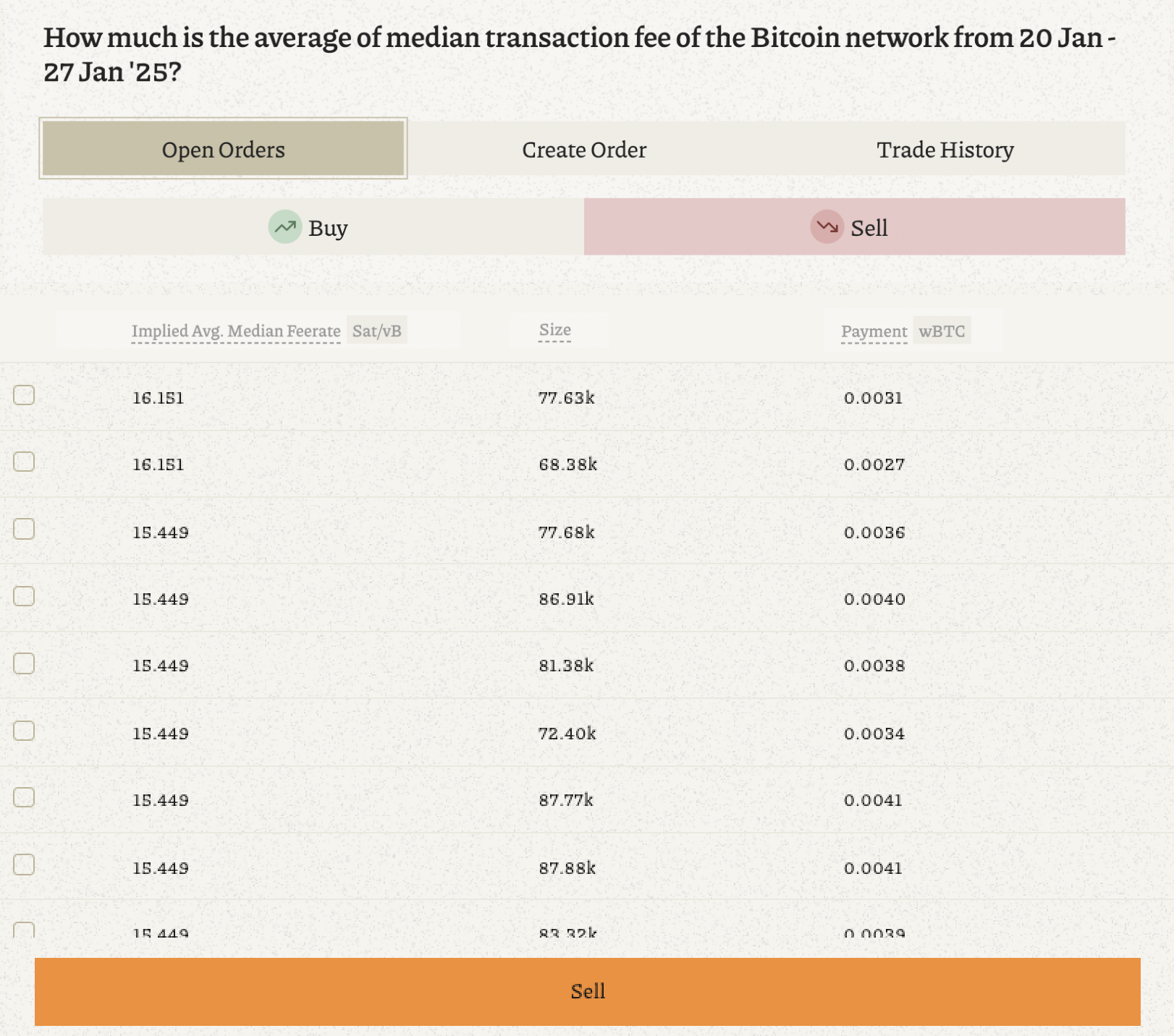
Forecast - Open Orders, Short orderbook
Resources
6. Create your own order
If you did not manage to find a good order, you can create your own order. Here, you have full control over the Implied Avg. Median Feerate, size, and expiration. However, it is not without its limitations.
Custom orders are created and placed on the orderbook for other traders to fill. If it is not filled before its expiration, the order will be removed from the book.
To ensure that the custom order gets filled before its expiration, it needs to be competitive within the orderbook.
Thus, before creating an order, it is important to get a feel of the market sentiment.
Price
The aim is to have your order at the top of the orderbook -> check the Best bid/ask
Best Bid: This is the best Short order in the orderbook
Best Ask: This is the best Long order in the orderbook
These values, when compared to Avg. BTC fee, could provide insight on how competitive your order needs to be.

Forecast - Best Bid/Ask
Size
The aim is to find the perfect balance between being big enough to capture profit and being small enough to fit the general risk appetite.
Expiration
The aim is to have it available long enough for other traders to discover, and short enough so that you can make any changes to your order if needed.
Resources
If you've decided to Long
- Navigate to "Create Order" and “Open a Buy Position”
- Input size
Based on your risk appetite, input a value insizethat best reflects that. The minimum size is 10,000 vB. The larger the value, the bigger your risk appetite. - Input
Implied Avg. Median Feerate
Based on your research of on-chain events, input a value inImplied Avg. Median Feerate. For example, the currentAvg. BTC feeis 10 sats/vB. You have determined that the finalAvg. BTC feewill increase and land at 15 sats/vB. The best range of values to input here will be 10.001 - 14.999 sats/vB.
Recall that you will only profit the difference between your price and finalAvg. BTC fee if the former is lower.
- Refer to
Best bid/ask
The aim here is to ensure that your order'sImplied Avg. Median Feerateis slightly higher than theBest Bidi.e. yourImplied Avg. Median Feerate>Best Bid - Input
Expiration
This is the number of hours you'd like your order to remain on the orderbook. The longer the duration, the more likely your order will be seen.
Note: It is free to create your own order, but if you decide to cancel your order before the expiration, you would have to cover the cost for gas.
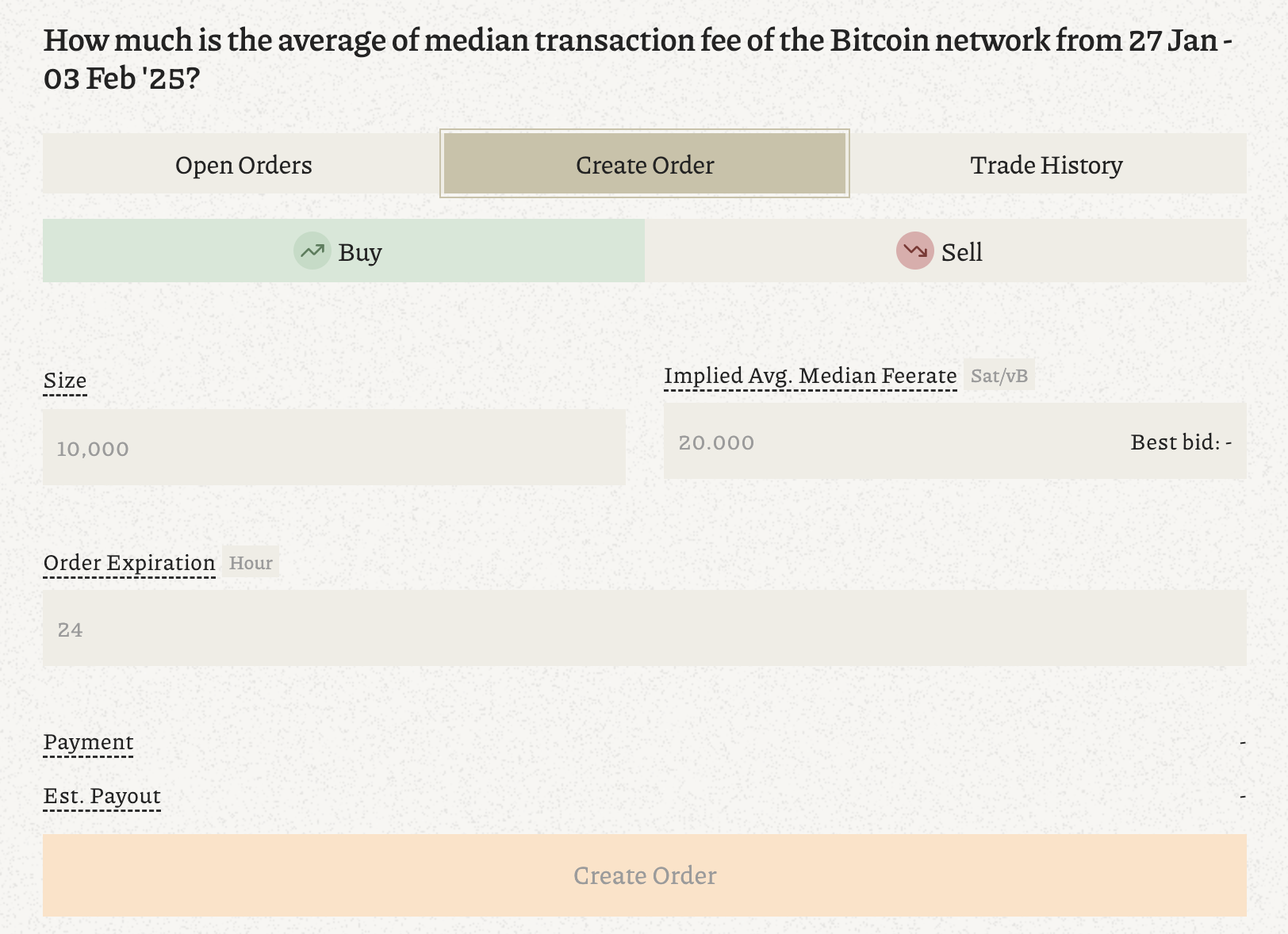
Forecast - Create Order, Long order

Forecast - Cancel order
If you've decided to Short
- Navigate to "Create Order" and "Open a Sell Position"
- Input
size
Based on your risk appetite, input a value insizethat best reflects that. The minimum size is 10,000 vB. The larger the value, the bigger your risk appetite. - Input
Implied Avg. Median Feerate
Based on your research of on-chain events, input a value inImplied Avg. Median Feerate. For example, the currentAvg. BTC feeis 10 sats/vB. You have determined that the finalAvg. BTC feewill decrease and land at 5 sats/vB. The best range of values to input here will be 5.001 - 9.999 sats/vB.
Recall that you will only profit the difference between yourImplied Avg. Median Feerate and final Avg. BTC fee if the latter is lower.
- Refer to
Best bid/ask
The aim here is to ensure that your order'sImplied Avg. Median Feerateis slightly lower than theBest Aski.e. yourImplied Avg. Median Feerate< Best Ask - Input
Expiration
This is the number of hours you'd like your order to remain on the orderbook. The longer the duration, the more likely your order will be seen.
Note: It is free to create your own order, but if you decide to cancel your order before the expiration, you would have to cover the cost for gas.
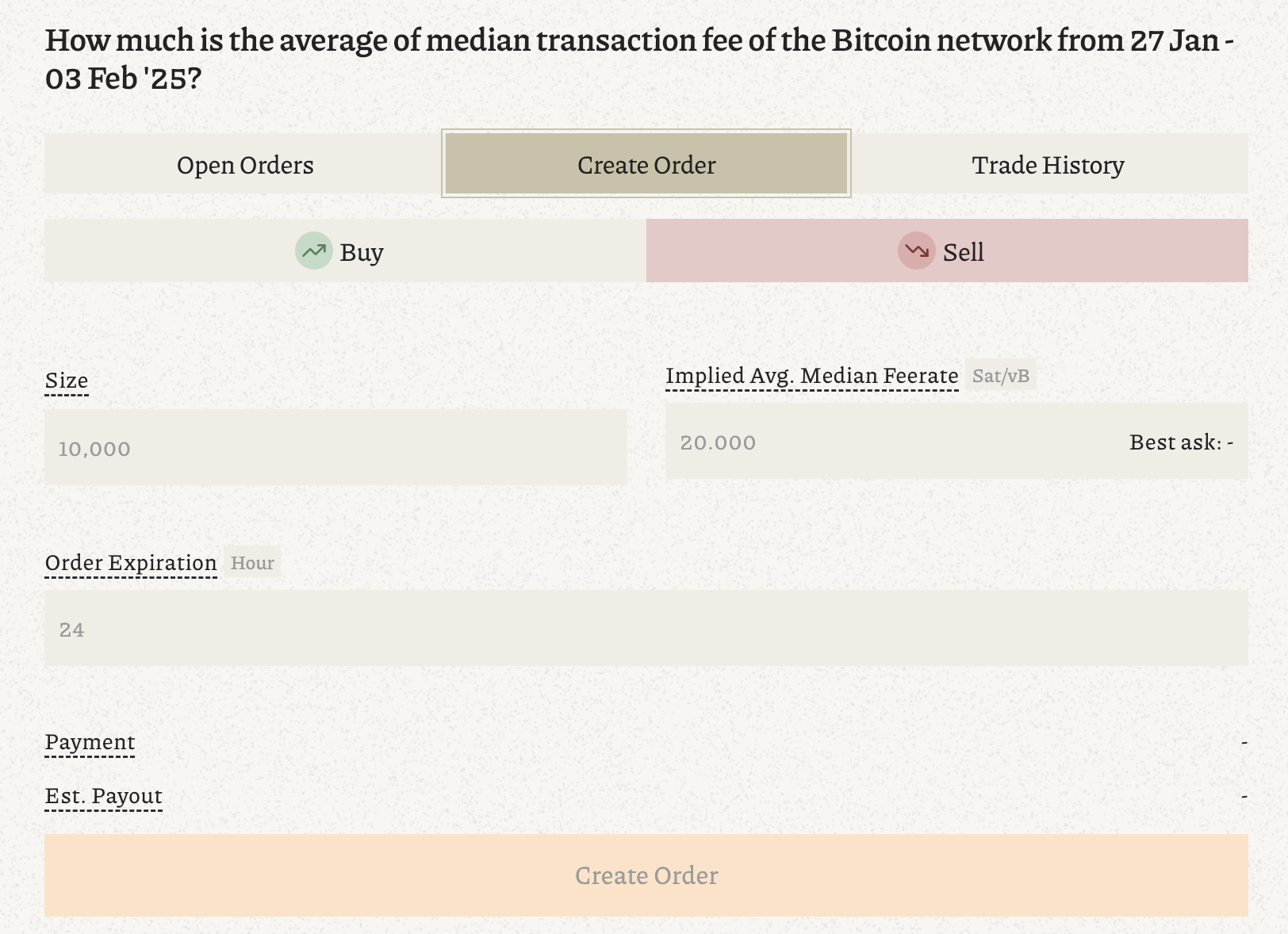
Forecast - Create Order, Short order
Voilà! Welcome to Alkimiya, Trader!
This journey is not one to be taken alone.
Updated 9 months ago
